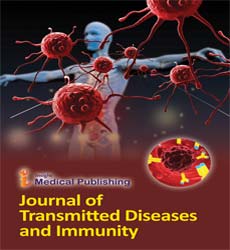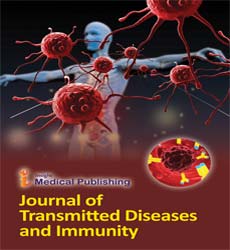ISSN : 2573-0320
Journal of Transmitted Diseases and Immunity
Why there are No Vaccines for Dengue Hemorrhagic Fever so Far?
Alexander E Berezin*
Department of Internal Medicine, Zaporozhye State Medical University, Ukraine
- *Corresponding Author:
- Alexander E Berezin
Department of Internal Medicine, Zaporozhye State Medical University, Ukraine
E-mail: berezinalexander@yahoo.com
Received Date: September 09, 2021; Accepted Date: September 29, 2021; Published Date:October 06, 2021
Citation: Berezin AE (2021) Why there are No Vaccines for Dengue Hemorrhagic Fever so Far?. J Transm Dis Immun. Vol.5 No.5:44.
Short Communication
Dengue is life threatening and rapidly emerging falviviral infection transmitted by mosquito vector and having significant socio economic impact. This disease is widely prevalent in the tropical and subtropical climates. Currently nearly forty percent of the world population is at the risk of contracting the dengue infection. Presently, only supportive care only exists as the sole form of treatment as there are no available antiviral treatments. There have been several studies on the epidemiology, transmission, screening, diagnosis, pathogenesis, prevention, control and treatment of dengue. However there exists certain gas that need to be filled. Both the climatic and economic factors have a significant contribution in the incidence and the emergence of the dengue epidemic [1]. With regard to antiviral drugs several drug repurposing strategies are being explored and focus is on developing specific anti-dengue drugs for restriction of the viral replication within the human body. Dengue has become as public health concern in the tropical countries. The governments need to allocate sufficient fund for the prevention of dengue transmission. Dengue hemorrhagic fever is correlated with the antibody dependent enhancement cytokine Deregulation and variation of the lipid profile. Active and continuous surveillance and the development and promotion of the traditional immune boosting medications are therefore desirable [2]. The disease is widely prevalent in the areas where Aedes mosquitoes are present. The disease can manifest with wide range of clinical presentation from febrile syndrome to severe form of plasma leakage. The severe form of Dengue infection is associated with secondary infection with a different DENV serotype (DENV-1 to 4). A second infection of dengue elicits antibody dependent enhancement response thus aggravating vascular permeability and hemostatic disorder [3]. The available vaccines do not provide protection from all the four serotypes. However, a preventive vaccine exists that was approved in the year 2015 but their safety and efficacy are not clear. The development of the vaccine is mainly hampered due to the lack of clear understanding of the dengue pathogenesis and immunology. Development of the new vaccines is underway and there has been a tremendous effort for the control of vector in prevention of the transmission [4]. New therapeutic and prophylactic approaches are being explored along with the possibility of the complementary medication and methods for the control and alleviation of the disease burden.
Therefore currently the only prevention strategy is to control the mosquito and human vector based transmission of the disease. Therefore health education among the parents, teachers and the children is essential for the effective prevention and control of dengue fever.
It is very disheartening to know that daily more than one million people are infected with the dengue virus. All age groups are vulnerable to dengue fever and vaccines are very much required for the prevention. The efficacy of the Dengvaxia a live attenuated tetravalent dengue vaccine approved by the US FDA varies according to the age group and the serotype [5]. Safety and efficacy of the dengue vaccine is a challenging task as the seronegative recipients showed increased risk of severe dengue and the vaccine could potentially sensitize dengue naïve recipients to severe dengue fever. The live attenuated vaccine has inherent capacity to predominantly elicit the antibodies against the viral epitope and these antibodies are generally cross reactive among the various serotypes thus may lead to high risk of antibody dependent enhancement thud increasing the cell virus load and replication [6]. Development of the serotype specific vaccine could potentially avoid this problem and could ado avoid immune evasion mechanism of the virus. The type specific EDIII antibodies may protect from the disease by bypassing the ADE and cross reactive antibodies. Hence dengue vaccines are included in the National immunization programs of several countries due to uncertainty. Creation of the public awareness regarding the transmission and severity of the symptoms through e-platforms is therefore very essential [7].
There is the possibility of developing a safe and effective vaccine by the use of adjuvants and delivery mechanisms that improve the safety, efficacy and affordability of the vaccines. Since the T cell response are being considered as the immune correlates of the protection the T cell mediated protection is need to be focused for the all novel vaccination strategies. The mRNA vaccines that are being developed for the COVID-19 may act as basis for the development of the safe dengue vaccine. However, the diversity of the virulence mechanisms among the different dengue strains is posing a great challenge.
References
- Wellekens K, Betrains A, De Munter P, Peterman, W (2020) Dengue: current state one year before WHO 2010–2020 goals. Acta Clin Belg: 1-9.
- Suwanbamrung C, Saengsuwan B, Sangmanee T, Thrikaew N, Srimoung P, et al. (2021) Knowledge, attitudes, and practices towards dengue prevention among primary school children with and without experience of previous dengue infection in southern Thailand. One Health 13: 100275.
- Shukla R, Ramasamy V, Shanmugam R K, Ahuja R, Khanna N (2020) Antibody-dependent enhancement: A challenge for developing a safe dengue vaccine. Front Cell Infect Microbiol 10: 572681.
- Ali M, Adlia A, Suwantika A A (2021) The Effect of E-Learning on the Attitude Toward Dengue Prevention and the Acceptance of Dengue Vaccination. Patient Prefer Adherence 15: 785-792.
- Tully D, Griffiths C L (2021) Dengvaxia: the world’s first vaccine for prevention of secondary dengue. Ther Adv Vaccines Immunother 9: 25151355211015839.
- Wang W H, Urbina A N, Chang M R, Assavalapsakul W, Lu P L, et al. (2020) Dengue hemorrhagic fever–A systemic literature review of current perspectives on pathogenesis, prevention and control. J Microbiol Immunol Infect 53: 963-978.
- Idris F, Ting D H R, Alonso S (2021) An update on dengue vaccine development, challenges, and future perspectives. Expert Opin Drug Discov 16: 47-58.

Open Access Journals
- Aquaculture & Veterinary Science
- Chemistry & Chemical Sciences
- Clinical Sciences
- Engineering
- General Science
- Genetics & Molecular Biology
- Health Care & Nursing
- Immunology & Microbiology
- Materials Science
- Mathematics & Physics
- Medical Sciences
- Neurology & Psychiatry
- Oncology & Cancer Science
- Pharmaceutical Sciences
